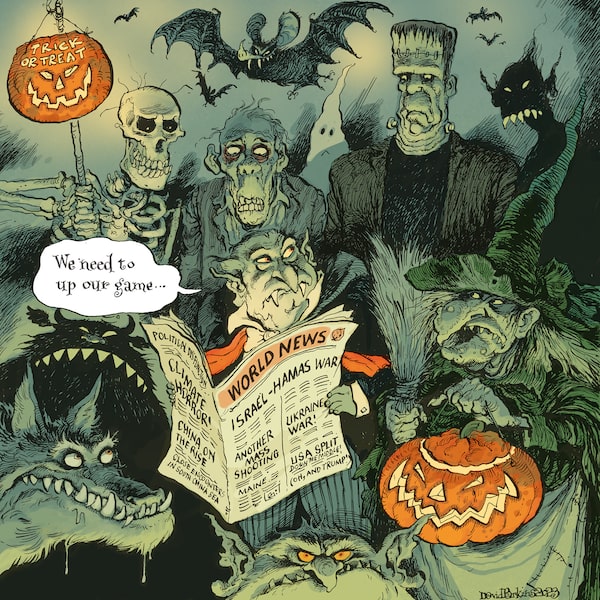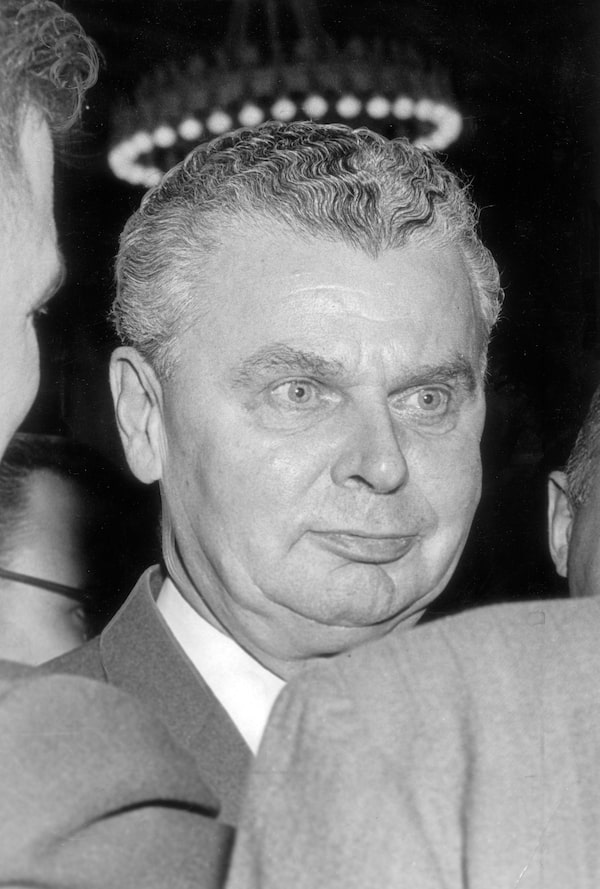Good morning,
Israeli troops pushed into the northern Gaza Strip on Monday, as the UN and medical staff warned that airstrikes are hitting closer to hospitals, where tens of thousands of Palestinians are sheltering alongside thousands of people wounded in the conflict with Hamas.
Yesterday saw nearly three dozen trucks enter Gaza in the largest aid convoy since the Israel-Hamas war began, and communications restored to most of Gaza’s 2.3 million people after an intense Israeli bombardment knocked out phone and internet services late Friday. But humanitarian workers said the assistance still fell desperately short of needs after thousands of people broke into warehouses for flour and basic hygiene products.
The UN agency for Palestinian refugees, known as UNRWA, called the raids on four of its warehouses “a worrying sign that civil order is starting to break down after three weeks of war and a tight siege on Gaza.” The scenes captured the widespread desperation in Gaza after two days of the heaviest air strikes in the 23-day-old war that now sees Israeli troops pushing slowly into the densely packed and desperately poor Palestinian territory.
- Trudeau’s antisemitism envoy faces criticism for silence on rising attacks on Jews since Israel-Hamas war
- Palestinian Canadians fear for relatives stuck in blackout Gaza as Israel intensifies attacks
- ‘Military actions don’t solve anything,’ son of Canadian hostage in Gaza says
Palestinians check the damage at the site of Israeli strikes on houses in Khan Younis.MOHAMMED SALEM/Reuters
This is the daily Morning Update newsletter. If you’re reading this on the web, or it was forwarded to you from someone else, you can sign up for Morning Update and more than 20 other Globe newsletters on our newsletter signup page.
Israel’s war rages in Gaza but fear and fury have fallen upon the West Bank too
Long-standing tensions in the West Bank have broken out into deadly violence against Palestinians since Oct. 7. Yesterday, 30 Israeli human-rights organizations called on the international community to “act urgently to stop the state-backed wave of settler violence that has led, and is leading to, the forcible transfer of Palestinian communities in the West Bank.” Nathan VanderKlippe reports.
Former Israeli PM says international troops should help stabilize Gaza after war
Former Israeli prime minister Ehud Olmert has proposed that international troops, possibly led by NATO, take temporary control of the Gaza Strip once the Israeli invasion to destroy Hamas has achieved its aims. Mr. Olmert presided over Israel’s 2006 war with Hezbollah, and served as deputy prime minister when Israel withdrew its soldiers and settlers from Gaza in 2005. Speaking to The Globe and Mail at his office in Tel Aviv, he said the international troops would likely have to remain in place for several years to stabilize the situation before the Palestinian Authority of president Mahmoud Abbas could take control.
Got a news tip that you’d like us to look into? E-mail us at tips@globeandmail.com Need to share documents securely? Reach out via SecureDrop
Also on our radar
Labour: Unifor workers at automaker Stellantis NV went on strike early this morning as negotiators failed to reach a deal by the midnight deadline. The union said progress had been made, and talks would continue through the night.
Seaway strike over: Unifor and the St. Lawrence Seaway Management Corp. reached a tentative agreement on Sunday night, ending an eight-day strike that halted marine traffic on the key waterway. Ship traffic will resume this morning, the company said.
Education: Ontario’s postsecondary system is at a crossroads as it awaits a blue-ribbon panel’s recommendations on the system’s financial stability, including whether schools should be allowed to increase domestic tuition fees.
Justice: As many as four in every five inmates in some provinces are being held in jail without being convicted of the offence they are accused of, a Globe and Mail survey has found.
Matthew Perry: The Friends actor hoped to be remembered for his off-screen life. “We should try to remember not what tortured Perry’s life but what gave it – and sometimes ours – meaning,” Barry Hertz writes.
- Tributes to Matthew Perry pour in from Adele, Justin Trudeau and co-stars after his death at 54
COVID boosters: There are two new COVID-19 vaccines to fight the XBB.1.5 Omicron subvariant that has become dominant across Canada. But some experts say public awareness efforts to drive vaccine uptake aren’t what they used to be.
- Related: New evidence confirms COVID-19 vaccines are overwhelmingly safe
Charity race in Ukraine: Amid the tragedies of the war in Ukraine, there are small victories. One of those moments came yesterday in Kyiv, when war amputees fitted with prosthetic legs took part in a charity race that made crowds cheer with pride.
Abortion rights in France: President Emmanuel Macron promised yesterday to enshrine a woman’s right to an abortion in the French Constitution by next year.
‘Bank of Mom and Dad’: Parents aren’t just helping their children with a down payment; high home prices and high interest rates are forcing them to co-sign on mortgages themselves.
- Sign up for the Newcomers’ Guide to Finances in Canada, a personal finance newsletter course
Haunted tourism: Every October, tourists flock to Salem, Mass., to see sites connected to the 1692 witch trials. But for some people, spooky season lasts all year long.
Morning markets
European stock indexes opened slightly higher as investors focused on the outlook for interest rates ahead of a busy week of central bank meetings and economic data.
Europe’s STOXX 600 was up 0.7 per cent. In early trading, London’s FTSE 100 advanced 0.8 per cent, Germany’s DAX rose 0.73 per cent and France’s CAC 40 gained 0.6 per cent.
Japan’s Nikkei fell 0.95 per cent to 30,696.96 amid speculation the country’s central bank might tweak its yield curve control policy when its two-day policy meeting wraps up on Tuesday. Hong Kong’s Hang Seng rose 0.44 per cent to 17,406.36.
The Canadian dollar traded at 72.19 U.S. cents.
What everyone’s talking about
Denounce and refute, don’t muzzle
“The right to free speech means nothing unless it includes the right to be radical, outrageous, offensive, obnoxious, even despicable. Leaders of universities, always cockpits of debate and havens for dissent, should know that.” - Marcus Gee
All of us could do with a check of the words we’re using
“But let’s not forget what the Jews have lived through and died from. The right to resist is their right as well. When we pray for peace, let that peace be for a safe and secure Israel as well as for Palestinians. And those who ask us to reflect on the words we use should reflect on their own words as well.” - John Ibbitson
To revive Canada’s economy, housing prices must fall, property investors must take a hit
“There’s probably no way around it: to revive the economy and overcome the housing crisis, property investors will need to take a hit, at least in relative terms.” - John Rapley
Halloween, you’re cancelled
“If you peruse family photo albums from 10 or more years ago, you have to brace yourself for the dress-up photos. Chances are that something someone was wearing would be deeply problematic by 2023 standards.” - Phoebe Maltz Bovy
Today’s editorial cartoon

Illustration by David Parkinsdavid parkins/The Globe and Mail
Living better
How hybrid workplaces and employees can navigate flu season
The pandemic saw many workplaces shifting to hybrid setups, and experts say workers should be cautious about using that added flexibility to work from home when feeling sick. With a current uptick in COVID-19 cases in Canada linked to two new variants, along with the usual cold and flu season, employment lawyer Brittany Taylor said it’s crucial that both employers and employees take the time now to consider how to handle sick days.
Moment in time: Oct. 29, 1959

Canadian Prime Minister John Diefenbaker appears to wear a halo at the Progressive Conservative Party convention in Toronto, November 3, 1959. A circle of lights is formed by a chandelier in a hotel convention hall, high above his head.John Boyd/The Globe and Mail
John Diefenbaker pictured with halo over his head
John Boyd’s father, John Boyd Sr., was an amateur photographer whose work was widely published. So The Globe and Mail’s veteran shooter knew from childhood how to use background lighting. In November, 1959, he caught prime minister John Diefenbaker at a Progressive Conservative convention in Toronto as an overhead ring of ballroom chandelier lights formed a halo over his head. Mr. Diefenbaker (his nickname was Dief the Chief), a Baptist who said he was a teetotaller, would have been chuffed by the angelic reference. He had won a general election in a landslide a year earlier and was still riding high. Twenty-five years later, during a federal election campaign, The Globe ran a photo of Liberal leader John Turner, by staff photographer Tibor Kolley, with forks seemingly coming out of Mr. Turner’s head. He looked like a devil and later lost in a landslide. Philip King
Enjoy today's horoscopes. Solve today's puzzles. Read today's Letters to the Editor.
If you’d like to receive this newsletter by e-mail every weekday morning, go here to sign up. If you have any feedback, send us a note.